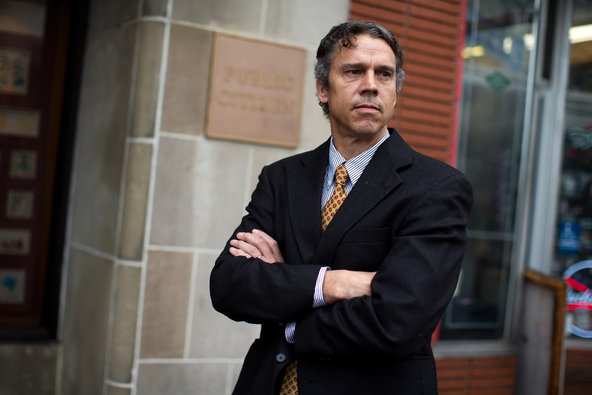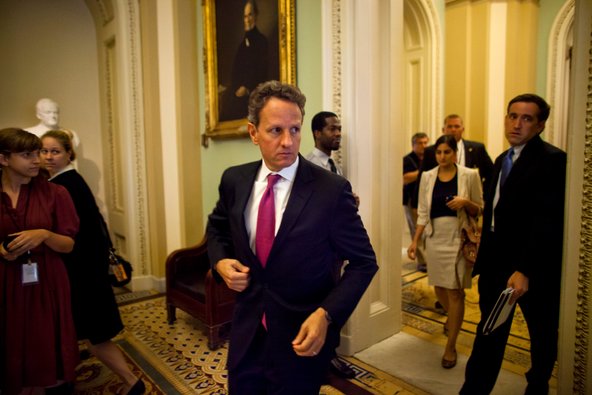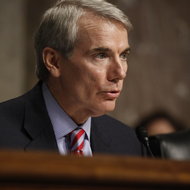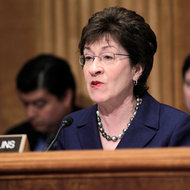 Doug Mills/The New York TimesBart Naylor of Public Citizen was critical of Treasury.
Doug Mills/The New York TimesBart Naylor of Public Citizen was critical of Treasury.
Government documents have recently emerged that offer a rare behind-the-scenes glimpse into the Obama administration’s decision-making as it prepared to take actions against two big British banks over money laundering.
In the case of the banks suspected of laundering billions of dollars through the American financial system — HSBC and Standard Chartered — authorities decided last year to level hefty fines rather than seek criminal charges. Those decisions raised concerns in Washington that some banks, having grown so large and interconnected, are too big to indict.
Related Links
The internal government documents, which revealed some tension among authorities about how aggressively to pursue the cases, suggest that at least one agency, the Treasury Department, was alert to such concerns. When authorities were being blamed for letting HSBC off the hook, Treasury officials assured top aides to Timothy F. Geithner, then the Treasury secretary, that monetary penalties were coming as “quickly as possible,” according to the documents reviewed by The New York Times.
The agency also contacted and persuaded a news organization to withdraw a report that wrongly blamed Treasury for not indicting HSBC, the documents indicate. (It’s the job of the Justice Department to decide criminal charges, Treasury explained.)
Ultimately, Treasury assessed a record $875 million fine against HSBC. But some critics wanted more, noting that Treasury’s own internal documents cite the bank’s “egregious violations” of money laundering laws as “qualitatively worse” than other banks.
“I would like to see Treasury support zealous prosecution, and instead I see them managing their image,” said Bart Naylor, a policy advocate at Public Citizen, a nonprofit group critical of the government for not taking a harder line with HSBC.
Treasury released the internal documents to Public Citizen through a Freedom of Information Act request. The group then shared the information with The Times. A spokesman for Treasury declined to comment.
 Jim Lo Scalzo/European Pressphoto AgencyTimothy F. Geithner, the former Treasury secretary, had a more staid philosophy in money laundering cases than other regulators.
Jim Lo Scalzo/European Pressphoto AgencyTimothy F. Geithner, the former Treasury secretary, had a more staid philosophy in money laundering cases than other regulators.
In a sign that the money laundering cases pitted authorities against one another, the Treasury Department raised concerns last year that New York’s banking regulator acted against Standard Chartered without sufficiently notifying federal authorities, the documents show. Treasury officials explained the concerns in an internal memo to Mr. Geithner.
The memo, internal e-mails show, was prepared for Mr. Geithner as “talking points” ahead of an October meeting with George Osborne, Britain’s chancellor of the Exchequer. In a September letter to Mr. Geithner, Mr. Osborne had expressed significant “concerns” about New York’s action, given that the United States and Britain typically collaborate closely on such cases.
While the talking points highlighted “Treasury’s coordination” with British regulators, it also distanced Mr. Geithner from the New York regulator, Benjamin M. Lawsky.
“Unfortunately,” the memo said, Mr. Lawsky’s office notified federal authorities “only hours before its public announcement.”
But people close to the case argue that federal authorities were aware that Mr. Lawsky was poised to act. Three months before filing the case, Mr. Lawsky’s office informed Treasury and other federal officials that it planned to soon take action against Standard Chartered, the people close to the case said.
The tension reflected a culture clash between Mr. Lawsky’s aggressive approach and the more staid philosophy common at the Treasury Department. A former terrorism prosecutor, Mr. Lawsky adopted a broader view of Standard Chartered’s wrongdoing than federal authorities, and even threatened to revoke its state banking license. At the time, Treasury and the Justice Department were not ready to act.
Matt Anderson, a spokesman for Mr. Lawsky, declined to comment. In a speech this April, however, Mr. Lawsky played down the tensions, saying “a dose of healthy competition among regulators is helpful and necessary to safeguarding the stability of our nation’s financial system.”
But in Washington, some discussions have taken a more hostile tone as the Justice Department faces scrutiny for not indicting HSBC.
The Justice Department has explained that it follows guidelines requiring prosecutors to weigh indictments of businesses with “collateral consequences” like job losses and, in the case of big banks, a threat to the economy. And in a recent letter to Congress, the department explained that it has “contacted relevant government agencies to discuss such issues,” including federal regulators.
But in Congressional testimony in March, David S. Cohen, Treasury’s under secretary for terrorism and financial intelligence, said “The decision whether to bring criminal charges is the exclusive prerogative of criminal prosecutors.” He added that “we were not in a position to offer any meaningful guidance” in the HSBC criminal case.
But inside the Treasury Department in late 2012, shortly after Congress scolded authorities for not yet punishing HSBC, officials appeared to make the civil case a significant priority.
Over several weeks, Treasury officials consulted two of Mr. Geithner’s top lawyers, Christopher Meade and Christian Weideman. The involvement of the lawyers, who were known at Treasury as Mr. Geithner’s top problem solvers, reflected the seriousness of the approach.
Treasury officials sent the lawyers “new developments” in the HSBC case. At one point, an official assured them that Treasury was moving “as quickly as possible to put together administrative penalty actions.”
When Treasury joined the Justice Department in announcing the case in December, a media outlet ran an overnight article in which a professor speculated that Mr. Geithner had not criminally prosecuted HSBC to avoid putting it out of business.
By dawn that day, Treasury officials e-mailed one another about the article. Shortly after, National Public Radio retracted the quote and issued a statement saying that Treasury had not been involved in the decision not to indict HSBC.
Article source: http://dealbook.nytimes.com/2013/05/29/documents-show-obama-officials-in-tension-over-british-banks/?partner=rss&emc=rss

